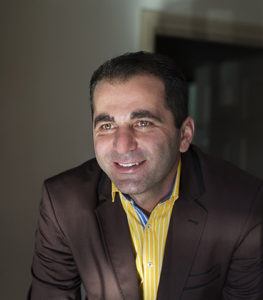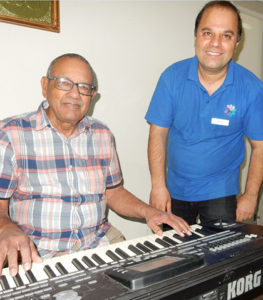The refugees supporting Victoria’s COVID-19 fightback
For Iraqi doctor Asseel Yako, being on the front lines of a battle against infection, trauma and death is nothing new.
Working as a doctor during the conflict in his homeland, Dr Yako saved hundreds of lives.
 His daily toil during that desperate conflict was tending to battlefield wounds suffered by soldiers or militia members fighting ISIS; or patching up women children horrifically injured in explosions of gunfire.
His daily toil during that desperate conflict was tending to battlefield wounds suffered by soldiers or militia members fighting ISIS; or patching up women children horrifically injured in explosions of gunfire.
Now, as a refugee resettled in Australia, Dr Yako is working in Victoria’s health service on the front lines of the fight against the COVID-19 crisis.
“I feel it is my responsibility to do what I can, as a doctor and as person living in Australia, to help to try to overcome this pandemic and save as many lives as possible,” Dr Yako said.
“Australia has given my family a safe place to live and my children a future, so whatever small contribution I can make does not repay that,” he said.
Dr Yako is one of dozens, if not hundreds, of former refugees making extraordinary contributions to the fight against the COVID-19 crisis in a variety of ways.
Many refugees and migrant families in Australia have lived through traumatic events with bouts of food insecurity and deprivation, rampant disease and open conflict.
The COVID-19 crisis has unearthed for these people memories of war, violence, and political turmoil.
Their stories from past crises could inform all us about what it takes to overcome adversity and the worst of times. And their actions during this most recent crisis could inspire us.
 Hadi Mohammadi is a musician and a refugee from Iran. He was jailed and tortured by the Iranian regime for playing western music and offered the choice of either giving up his career playing the saxophone or risk ending up in jail – or worse.
Hadi Mohammadi is a musician and a refugee from Iran. He was jailed and tortured by the Iranian regime for playing western music and offered the choice of either giving up his career playing the saxophone or risk ending up in jail – or worse.
He fled with his wife eventually finding his way to Australia as a refugee. He now works as a music therapist in a nursing home in Melbourne’s north.
The COVID-19 pandemic has meant the home is in lock down and residents and staff are under strict infection control protocols.
“It is a very worrying time for everyone. We don’t know what is going to happen,” Mr Mohammadi said.
“But I feel my work at the home is important. I try to keep the residents entertained and their spirits up through music,” he said.
“If we stick together and all do what the government is asking, things will get better. I feel lucky to be in Australia because many people in Iran are dying and the situation is very bad,” Mr Mohammadi said.
Syrian refugee Norma Medawar, who in fled her home in Damascus in 2016 at the height of the conflict there, now works to support families who have been left financially exposed by the economic fallout from the COVID-19 crisis.
She is part of the Whittlesea Food Collective program in Melbourne’s northern suburbs which provides basic necessities to people in need or who have no other source of support.
“We provide people in need with basic necessities and food. Anyone can call us and ask for help and we deliver to their homes,” Ms Medawar said.
“We especially support the elderly and asylum seekers but now the COVID-19 pandemic is with us, there is even more demand for our support,” she said.
“I feel good to be able to help people in need. It’s rewarding and I love what I do,” Ms Medawar said.
As a teenager Iranian refugee ‘Gina’ made a dangerous boat journey seeking safety from persecution and violence in her homeland.
After years of struggle, she and her family have built new lives in Australia and Gina has joined the thousands of Victorian health workers battling the COVID-19 pandemic.
As student nurse, ‘Gina’ has become one of the up to 20,000 student nurses co-opted into the health system.
“I am looking forward to getting to work in contributing to the efforts to help beat the virus,” said ‘Gina’, who did not want her real name used for fear of retribution against family members still living in Iran.
When the opportunity came to work as nurse to help fight the COVID-19 pandemic, ‘Gina’ jumped at the chance.
“When I am working to help people who are ill or distressed, it doesn’t feel like work. I feel like this is where I belong, it’s my second home,” she said.
“I am ready to do whatever I can to help fight this terrible pandemic. Nothing is more valuable than human life,” ‘Gina’ said.
Syrian refugee doctor Tamer Antakly is volunteering in his community to keep people informed about the COVID-19 pandemic.
Working with migrant and refugee settlement agency AMES Australia, Dr Antakly is using his language skills in English and Arabic to help newly arrived refugees and migrants understand the protocols and restrictions in Victoria’s pandemic response,
As he works to have his medical qualifications recognised in Australia, Dr Antakly is also willing to volunteer in any paramedical capacity that may become available.
“I am very happy to help in the fight against this terrible disease in any way possible. I feel it’s my duty as a doctor to do something to help,” he said.
“Being able to help gives me a feeling of satisfaction in contributing to this country – which has given my family safety. It’s a duty for everyone,” Dr Antakly said.
“It is rewarding to be able to sit and talk to people and help them understand what is going on and explain to them what they need to do and tell them that they are going to be OK,” he said.
Dr Antakly was working in Saudi Arabia when conflict broke out in his homeland, making it impossible for him to return to his home in Aleppo.
In 2015 he was granted a humanitarian visa to come to Australia and he has since been studying language and clinical courses to qualify to work as a doctor here.
Iraqi doctor Ann Shemiss said she would also jump at the chance to contribute to the fight against COVID-19.
“This is an emergency situation for the whole world. I would consider it my duty assist,” she said.
Dr Shemiss, originally from Qaraqosh – a Christian enclave in northern Iraq – was a GP in her homeland when war broke out.
Now in Australia, she has completed all the required exams and is waiting for registration as a practitioner.
CEO of migrant and refugee settlement agency AMES Australia Cath Scarth said refugees were overwhelmingly keen to contribute to the broader society.
“We see this time again, not just during the current COVID-19 crisis, that refugees overwhelmingly want to make contributions to society in all sorts of ways,” Ms Scarth said.
“There are high levels of volunteering among refugees and people are incredibly committed to becoming part of the broader society,” she said.
“A lot of refugees are incredibly grateful for the opportunity to settle and find safety and future for their children here in Australia; and so they want to give back,” Ms Scarth said.












